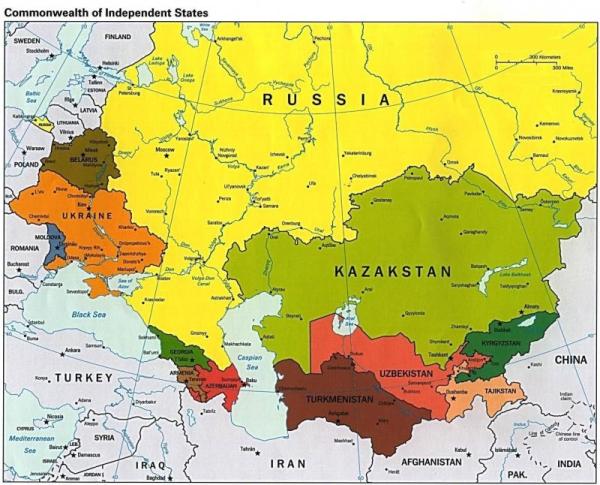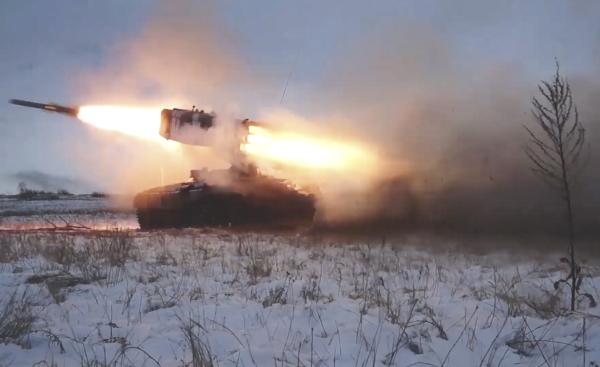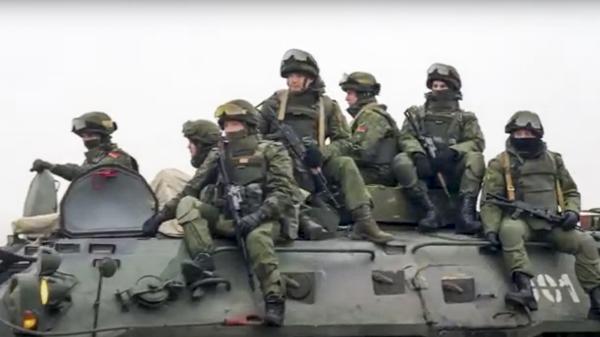
Countries that formerly made up the Soviet Union.
Major crises have been developing around two countries that border Russia—Ukraine and Kazakhstan. These crises are very different and we will deal with each separately. The situation in Ukraine is particularly dangerous, marked by ominous threats from all sides: Russia, with over 100,000 troops, is threatening to invade Ukraine if the U.S. does not back off on its policies of growing militarization of countries on Russia’s border. The U.S. is responding with threats of sanctions which seem to escalate by the day, economic sanctions that are meant to put immense pressure on Putin and his regime—and that could have a devastating impact on Russia’s 144 million people. Further, besides providing Ukraine with tens of billions of dollars of the world’s most advanced weaponry, the U.S. is promising to provide aid to armed insurgents there if Russia does occupy Ukrainian territory. And it is considering providing Ukraine with intelligence on Russia troop movements within its own country, which even U.S. officials acknowledge could lead “Ukraine to strike first”—i.e., could precipitate a war that wouldn’t otherwise happen.
All of this is quite ominous. Ukraine is a country in a strategic location, between two increasingly contending imperialist forces—the U.S.-NATO alliance, and Russia—so escalating conflict there could have major impact beyond that particular region. The U.S. and Russia are each tied by treaty obligations to defend various other countries in the region, there are a lot of conflicting interests among these countries, suspicion, paranoia, and bad history. No one is certain what the other side “really” intends to do. This is a “perfect” environment for disaster, either through intentional attack or one side misreading another and acting on that. And the U.S. and Russia are major nuclear powers.
It is really imperative that people around the world, including in the U.S., pay attention to what is happening, and oppose all the threats and brinkmanship coming from the major imperialist actors. And in the U.S. in particular, people need to be clear that the rulers of the U.S. are NOT “the good guys” and they are not fundamentally doing anything different than Russia—seeking to advance their imperialist interests and risking war to do it.
So here, we want to give readers a basic picture of what is going on.
Ukraine

In December, Russia began amassing troops on the Russia-Ukraine border. Vladmir Putin and other Russian leaders began making demands on Ukraine, the U.S., and on NATO (North Atlantic Treaty Organization). These demands are somewhat broader than just Ukraine. According to the New York Times, Russia is “demanding that the United States and its allies halt all military activity in Eastern Europe and Central Asia in a Cold War-like security arrangement,” and strongly implying that if this demand is not met, Russia will invade Ukraine.
Some background is important here: Ukraine is a large country of 43 million people. It is a major producer of grain but is overall quite poor. It is on the Black Sea, which is western Russia’s sole warm-water outlet to ocean. For almost 70 years it was a Soviet Socialist Republic within the old Soviet Union, but became an independent nation when the Soviet Union dissolved in 1991. It has a large minority of ethnic Russians, and even larger numbers of people who speak Russian as a second language, especially in the eastern part of the country.
Since independence, Ukraine has been a focus of bitter contention between the U.S. and Russia, with each country interfering heavily in Ukrainian affairs by backing different forces in the Ukrainian ruling class that they hoped would serve their interests. In 2014, Russia took this to another level by invading and then annexing Crimea, a strategic peninsula in the Black Sea. Russia also instigated, or at least supported, a separatist rebellion among the Russian minority in two eastern states.
The U.S. for its part has been working to expand NATO—the military alliance it built after World War 2 explicitly to mobilize forces against the then-Soviet Union—right up to the borders of what is now Russia. Ukraine is not in NATO, nor is it in the process of joining, but it does openly aim to be part of it—this goal is actually in the Ukrainian constitution. And even without being in NATO, Ukraine has received enormous amounts of U.S. military aid—2.5 billion dollars since 2014. According to an expert interviewed by the New York Times, “the ‘Kremlin increasingly views Ukraine as a Western aircraft carrier’ parked at Russia’s southwestern border.”

Firing of Russian weapons as part of military drills and troop buildup near Ukraine border, December 2021. Photo: AP
It is widely believed that the Ukrainian military would be overwhelmed if Russia invades and the U.S. has said that it will not intervene militarily. But the U.S. is threatening to impose what it hopes will be economically crippling sanctions1, and to provide weapons for a Ukrainian resistance, forces for which are already being organized. The U.S. is hoping that these threats, and the experience of the Soviet war in Afghanistan in the 1980s—which played a big role in the collapse of the Soviet Union—will serve as a “deterrent” to Russia today.
No one knows what Russia’s intent is—whether it actually plans military action or is just “making a point.” And currently, negotiations are going on, mainly between NATO, the U.S. and Russia (but not Ukraine!) to try to resolve the crisis and determine Ukraine’s fate. But latest reports are that the two sides are moving further apart. Things remain uncertain, but very dangerous. A war that starts with Ukraine could spread in Eastern or Central Europe, and if NATO countries that border Russia became involved, the U.S. and other major powers could be drawn in.
Russia is no longer a “Great Power” in the sense that the Soviet Union was when it was leading its own war bloc (the Warsaw Pact) and contending with NATO and the U.S. over world domination. But it continues to be a significant force, especially militarily, and particularly its nuclear weapons. And it continues to be an obstacle to U.S. power in Europe and elsewhere. So the U.S. seeks to encircle Russia with NATO or NATO-aligned countries, and Russia seeks to reestablish the kind of sphere of influence and “buffer” around it that the Soviet Union had. And both are playing dice with the possibility of war that would kill thousands, tens of thousands or even millions.
None of this—on either side—is in the interests of humanity. And especially in the U.S., people need to oppose the moves of “our” rulers, the U.S. imperialists—because their actions around the world, whatever the pretexts, are unjust, and because the defeats they suffer weaken their empire’s predatory grip on the people and the planet. So we should not only welcome those defeats, but train—and struggle hard with—others to do so as well, with the stand of seizing on their defeats to bring the revolution closer. In fact, this kind of contention among big powers to dominate portions of the world, or regions of it, should be a major driver for people everywhere to take up the new communism and fight for a world where such barbarism would be unimaginable, instead of routine.
An excerpt from THE NEW COMMUNISM
by Bob Avakian
From the section: “Internationalism—Revolutionary Defeatism”
What do I mean by revolutionary defeatism, and why is it so important? Revolutionary defeatism means that you oppose the actions of your own government and ruling class in carrying out their wars, which are wars for empire. It means that you welcome any setbacks they suffer in those wars, because that weakens their oppressive hold over masses of people, here and in the world more generally. Now, we do have to recognize that we have a different situation than back in the day with the war in Vietnam. In those days, the National Liberation Front (NLF) in Vietnam was a revolutionary organization of the people in South Vietnam who were waging the fight, along with the government and people in North Vietnam, against the U.S. imperialists. And the leader of that struggle, until he died in the late 1960s, was Ho Chi Minh, who called himself a communist but was actually more of a revolutionary nationalist. Beginning soon after the end of World War 2, Ho Chi Minh led the armed struggle of the Vietnamese people to drive out the French, who had colonized Vietnam, and then to drive out the Americans, who, beginning in the 1950s, attempted to replace the French as the colonial master of Vietnam. Now, back in those days we used to go to demonstrations and people would march through the streets chanting, “Ho, Ho, Ho Chi Minh, NLF is gonna win.” It felt very good, and it was right to do it. It was right to be on the side of the Vietnamese people and Ho Chi Minh leading them. It wasn’t just that you wanted your government to lose the unjust war it was waging, you could actually be on the side of the people fighting against your government, because those people represented a righteous cause, they represented a real struggle against imperialism. They weren’t going around attacking civilians. They were fighting against the military of U.S. imperialism that had invaded their country and was bombing it massively. So, in those days, you could actually be with the people fighting against the U.S. government, the U.S. imperialists.
Today, unfortunately, the situation is different and not as favorable in the short run. Nobody coming from a decent place should want to root for these reactionary Islamic jihadists who are in fact also enforcers of brutally oppressive relations—particularly, but not only, horrific patriarchal relations—and who, in the service of that, carry out all kinds of depraved slaughter of ordinary civilians. So you cannot, if you’re coming from the right place, identify in any way with these forces and support them. Now, there are some people around the world who call themselves leftists or even communists or Maoists, people like this guy Ajith, who try to put a pretty face on these Islamic fundamentalist jihadists and insist that they are anti-imperialists, that they’re waging an anti-imperialist struggle. But the fact is that, while they may fight against the U.S., they do not represent a positive, progressive, let alone a revolutionary force; and where they have succeeded in exercising power, their rule is brutally oppressive. That has been shown repeatedly in the real world. In your mind, you can try to make these people into something other than what they are, but that can only do a great deal of harm, because in the real world they are not a positive force, even while, coming from where they’re coming from, they’re opposing U.S. imperialism, to some degree, although not in any thoroughgoing way and not toward any positive end.
This makes for a difficult situation because, especially given how parasitic U.S. society is—where significant sections of the people, particularly among the middle strata, receive some share of the spoils from imperialist domination and plunder in the world—when the U.S. government is able to point to the continuing atrocities carried out by these Islamic fundamentalists, this reinforces the tendency for people to side with, or at least not to seriously oppose, their own country and government in the wars it is waging against these Islamic fundamentalists. It makes it easier for people to go along with what is, and take the position: “I don’t really like these wars, but look at these other people; we have to do something about groups like ISIS.” Never mind the fact that Saudi Arabia, a big ally of the U.S., beheads a lot more people than ISIS does, and embodies and enforces all kinds of horrendous oppression, against women and others. But still, people can say, “Well, look at these people, like ISIS.” This makes it easier for people not to do the hard thing of going up against their own government in the wars it is waging.
Yes, it is true: the Islamic fundamentalists who are opposing these imperialists are no good, they don’t pose a positive alternative. But that does not make the wars of empire being fought by this government just wars. This situation has gone on way too long and needs to be frontally and deeply challenged. These are wars for empire. These are unjust wars. They are carried out with massive means of destruction, killing civilians in the hundreds of thousands, torturing people in the service of these wars. This should be opposed and opposed strongly. It is not acceptable that people just take the stand, “Yes, I wish those wars would be over with, but we gotta do something about these Islamic fundamentalists.” It is crucial that people come to see what the nature of these wars being waged by their government actually is, and why these wars have to be actively opposed; and even if you can’t, and shouldn’t, support the other side, you still have to have the basic approach of welcoming the defeat of your own government in the wars it is waging. The defeat of these imperialists should be welcomed because, number one, their wars are unjust, even if the people opposing them are also unjust. And, two, every such defeat weakens this system and its ruling class and brings closer the time when people can actually bring it down and bring something liberating into being in its place.
Kazakhstan: Protest, Brutal Repression, and Military Intervention

Belarusian peacekeepers ride an armored personnel carrier as they leave a Russian military plane at an airfield in Kazakhstan, January 8, 2022. Photo: AP
Kazakhstan is a large, landlocked country bordering Russia, in Central Asia. It has less than 20 million people. It has a large oil and gas industry that generates a lot of wealth which goes mainly into the hands of foreign investors (including U.S. oil companies) and the local ruling class. Poverty and repression—including torture in the prisons—are widespread.
Like Ukraine it was once a Soviet Socialist Republic within the Soviet Union, and since independence has been a focus of contention between the U.S. and Russia, with China (which it also borders, and which seeks to be the dominant imperialist power in Central Asia) as well in the mix. The U.S. has held its own in this contention: in fact, the U.S. Air Force maintained a base there to support its war in Afghanistan, until 2014. In September 2021, President Biden told President Kassym-Jomart Tokayev that “the United States is proud to call your country a friend.”
At the beginning of January, massive protests against high prices, low wages and corruption erupted in a remote western oil town on the shores of the Caspian Sea. While these protests were peaceful, they quickly spread thousands of miles east to the prosperous economic center of Almaty, where they took a violent turn. While the situation is confusing, it appears that the protests of the masses in the west become interwoven with a sharp struggle between the current ruler (President Kassym-Jomart Tokayev) and the former ruler, Nursultan Nazarbayev, who remained in charge of the country’s security apparatus. Tokayev fired Nazarbayev and his allies from the security force (indicating that he at least thought Nazarbayev was tied to the riots) and that itself led the riots to take a leap in intensity, with arsenals looted and government buildings burned down. The Tokayev government responded with brute force, with Tokayev calling on his troops to shoot to kill protesters—Al Jazeera reports 160 deaths and 4,000 arrests.
Still this was not enough to regain control, and so Tokayev called upon the Collective Security Treaty Organization—Russia’s equivalent of NATO—to send aid. CSTO dispatched 2,500 troops, including battle-hardened units from Russia that had been used in crushing rebellions in Chechnya, as well as in wars in Syria and the annexation of Crimea.
These troops have for the moment restabilized the government, but they have likely also put an end to the “balancing act” that Kazakhstan was conducting between the rival powers of Russia, China and the U.S., planting it much more solidly in the Russian camp.